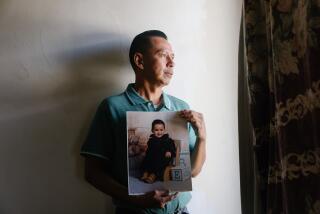Paroled Man Who Set Son Afire Tells of His Life Now
- Share via
Charles Rothenberg, the man who set his son afire in a Buena Park motel room seven years ago, surfaced Thursday for the first time since his parole, saying he lives in Oakland and moves about freely at restaurants and other public places. Nobody, he said, recognizes him.
“It’s a crummy neighborhood. Very bad. Gunshots all day and night,” Rothenberg said in a two-hour telephone call to The Times. “The crack dealers and drug addicts could care less if I’m here.”
Speaking from a telephone booth, Rothenberg confirmed that he is wearing an electronic surveillance anklet and is under round-the-clock guard by a rotation of parole agents. He said the parole agents follow him or drive him wherever he wants to go--grocery shopping, walking around town, road trips out of town.
“I can do pretty much what I want,” he said. “I’m just the most-watched man in America.”
Rothenberg, 49, nearly burned his then-6-year-old son to death with kerosene on March 3, 1983, in a twisted plot to hurt the wife who divorced him. The fire left David Rothenberg disfigured, with third-degree burns over 90% of his body. The boy has said he fears that his father will hurt him again.
At the time of the incident, Rothenberg had taken his son from New York without permission from his ex-wife for a week’s visit to Disneyland and Knott’s Berry Farm.
In a phone conversation that both parents agree triggered the tragedy, Marie Rothenberg threatened to withhold visitation rights upon David’s return to Brooklyn. The same day, Charles Rothenberg took his son to a hardware store, where he purchased the jug of kerosene he would use to torch the boy that night.
Rothenberg’s whereabouts have remained secret since his Jan. 24 prison release. There had been speculation that he had been paroled to Alameda County, but state Department of Corrections officials never confirmed that.
State officials feared an embarrassing repeat of the case of Lawrence Singleton, the man convicted of raping and hacking the arms off a teen-age girl. When Singleton was paroled and his whereabouts became known, mobs of Northern Californians drove him out of several towns. Repeated relocations to protect Singleton’s safety cost the state about $2 million.
When Rothenberg was released, he was placed under the tightest security ever for a California parolee. Keeping Rothenberg on parole costs California taxpayers $18,000 a month, much of that in parole agents’ salaries.
Corrections spokesman Tipton C. Kindel said earlier that the need for such intense security may be reviewed in the future if deemed unnecessary and overly expensive. Kindel declined to comment on Rothenberg’s call to a reporter.
Rothenberg described his parole agents as “very nice people” but said he wants to be out from under their supervision. He claimed that James Rowland, the state Department of Corrections director, told him during a Valentine’s Day visit to his apartment that the 24-hour supervision may be dropped this summer if he continues to keep a low profile.
“He thanked me for my cooperation. He’s big . . . looks like Jackie Gleason,” Rothenberg said, laughing. “He was only here 10 minutes. I told him I want to live like a normal person and he said, ‘You lay low, and you will.’ ”
Sounding in good spirits but saying he is lonely, Rothenberg said his parole agent watched him from a nearby car as he used the pay phone, but the agent did not know he was calling a reporter. Rothenberg told the parole agent only that he was talking to a friend in Los Angeles.
“They think the media is going to create a mob scene if they find out where I am,” he explained.
Rothenberg said he works at a part-time job but declined to say what it was. He said what he earns is returned to the state, which pays for his expenses. Whenever he goes to the market, he said the parole agent pays the bill.
Rothenberg said he has been to restaurants such as the Sizzler and “some really nice places. A very good place in Berkeley.” He also cooks for himself.
“I’ve been a waiter and I’m a pretty good cook. My best dish is lasagna. I cook myself eggs, my own breakfast, whatever. I’m pretty domestic,” he said.
Rothenberg said his apartment is clean even though it is located in a crime-ridden neighborhood. He watches a lot of television and reads some, but doesn’t care much for the newspapers that parole agents bring him.
“I don’t like them because I don’t like to read about violence,” he said.
Rothenberg said he wants to find a job in private enterprise, in word-processing or waiting tables. But he has yet to go on a job interview. Parole agents, he said, have told him to wait a bit longer to assure that his face has been forgotten.
“They won’t even let me give blood to the Red Cross for the same reason,” he said. “I’m not really worried about this witch hunt they talk about. I think (the interest) has diminished considerably. I don’t think people really care.”
The case of the father trying to kill his son in such a horrible way had shocked the public. A Whittier family that told newspapers that they would try to help Rothenberg on his parole claim they received death threats, and an inmate at the California Men’s Colony in San Luis Obispo, indignant over Rothenberg’s pending release, attacked him.
When his parole ends in two years, Rothenberg said he hopes to remain in California but vows to never call or visit his son.
“My main thing is to be a good man. A good person. And I would be remiss in not saying that sometime before I die, I’d like to see David,” Rothenberg said. “But I see that as remote. I was really upset to hear him call me Charles, not Dad. When he looks in the mirror or gets harassed he thinks of me as the perpetrator of this crime.”
Told of Rothenberg’s revelations, David Rothenberg’s stepfather, Buena Park Police Lt. Richard Hafdahl, said: “I don’t know that David cares. We don’t have any comment because we don’t care where he is or how he is. He’s not a part of our lives anymore.”
More to Read
Sign up for Essential California
The most important California stories and recommendations in your inbox every morning.
You may occasionally receive promotional content from the Los Angeles Times.













